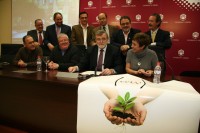 The University of Córdoba was this afternoon awarded the status of Campus of International Excellence following recognition of its Agri-food project, CeiA3, which involves the strategic cooperation of five universities: Almería, Cádiz, Córdoba, Jaén and Huelva. The five have pooled their efforts in a sector of key importance for the national and regional economy, thus contributing to economic, social and political development in an age of increasing globalisation, and therefore securing a solid future.
The University of Córdoba was this afternoon awarded the status of Campus of International Excellence following recognition of its Agri-food project, CeiA3, which involves the strategic cooperation of five universities: Almería, Cádiz, Córdoba, Jaén and Huelva. The five have pooled their efforts in a sector of key importance for the national and regional economy, thus contributing to economic, social and political development in an age of increasing globalisation, and therefore securing a solid future.
The result of this first round of applications for recognition as an International Campus of Excellence was announced early this afternoon by the Ministry of Education, and was warmly welcomed by the Chancellor of the University of Córdoba, Mr. José Manuel Roldán Nogueras, who noted that the CeiA3 project was particularly valuable in that it highlighted the ability of the five Universities involved to “work together to achieve the critical mass required to develop a project which we must immediately link to the wider productive network”.
The coordinator of the project drafting team and Vice-Chancellor for Scientific Policy, Enrique Aguilar Benítez de Lugo, stressed that achieving this seal of excellence “is not to be seen as an end in itself, but rather as the dawn of a new age”. Aguilar noted that the bringing together of Spanish Universities as Campuses of Excellence marked a change of approach, adding that the coordinating team would be starting work straight away.
The CeiA3 project is unique in Spain, in terms of both the number of universities involved and the nature and scope of their commitment. The project seeks to take a leading role, at national and international level, in research, transfer and the training of experts in all aspects of the agri-food sector, but especially in food production systems, food safety, environmental protection and sustainable development.
The production of sufficient safe food to feed the world is currently a major challenge, fuelled by population growth and increasing incomes in developing economies (BRICs) and emerging markets. This will prompt a growth in demand, and therefore in food flows and transport, leading to a need for greater food safety; inadequate food safety measures (as the “mad cow” outbreak showed) can have enormous economic and health-related repercussions. At the same time, any increase in food production entails the need for greater environmental protection through the agri-food sector, finding solutions to associated problems such as pesticide use and the management of waste – for example, of plastics in greenhouses – as well as seeking alternatives such as the development of renewable energy sources. These challenges, together with a growing emphasis on sustainable development and the appearance of new areas of activity (e.g. new foods and treatments, the identification of health benefits, new ideas and approaches in the catering industry), call for the development of new leading-edge technologies, greater specialist training and greater knowledge.
With this in mind, the ceiA3 project gives concrete expression to a relationship already existing between the five universities involved and their respective networks of participating bodies. At present Almería, Cádiz, Córdoba, Huelva and Jaén are leading players in the production, export and marketing of oil, meat, strawberries, Iberian pork products, dairy produce, wine, fruit and vegetables; together they boast immense academic and research capabilities – 3,270 lecturers and scientists, and over 200 specialist agri-food research groups – covering an area of 50,000 kms2 with a population of over 4 million. The project enjoys the strong support of three Departments of the Andalusian Regional Government (Innovation, Science and Business; Agriculture and Fisheries; and Environment), five technology parks and other centres, most Andalusian agri-food businesses and foundations such as Triptolemos, whose members include the leading Spanish agri-food companies. Further support comes from bodies such as the Higher Scientific Research Council (which will foster project implementation), as well as local and provincial councils.
This project seeks to create an international network of talent by enhancing scientific and teaching skills, stressing R+D+i through the use of the “open research” model, and developing the campus within an integrated social model; given the synergy existing between the ceiA3 project and the environment, special attention will be paid to environmental conservation and sustainability.
Within this framework, the project aims to enhance the transfer of knowledge and technology to businesses by encouraging joint university/business projects, by training specialist managers and technicians, by interacting with other players at local and national level, by creating new infrastructure and by optimizing existing facilities in the production sector. At the same time, a new management and coordination structure will be created around three units responsible for teaching, research and transfer, and internationalization; this structure will be reviewed regularly by an international committee. Strategic guidelines will be laid down by a Steering Council and implemented through a professional coordinator appointed by means of an international selection process.
In short, the ceiA3 project is designed to provide, by 2015, an efficient response to the agri-food challenges to be faced by the global economy over future decades, through training, research, innovation and the generation of knowledge.

